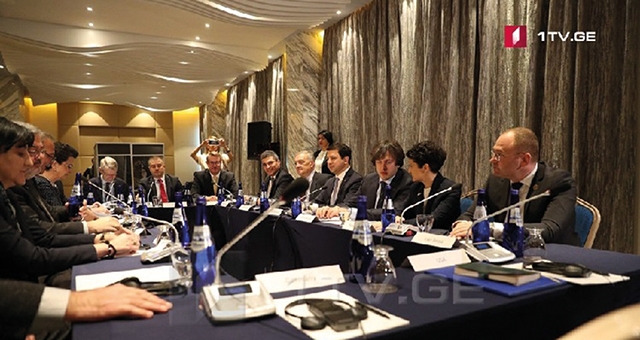On the Protests & 2020 Elections
The leader of ‘New Georgia’ party Giorgi Vashadze announced that next week the protest rallies will continue in regions throughout the country.
Vashadze added that the opposition is waiting for the OSCE`s (Organization for Security and Co operation in Europe) conclusion on the draft law created by the opposition in regard to the electoral system, after which the date of the most large-scale rally will be defined.
"The rallies will initially be held in Kutaisi. We are waiting for the Legal Issues Committee before we picket Parliament. Most likely, this will happen on Tuesday, Wednesday, or Thursday," he said.
On November 30, a meeting between the ruling Georgian Dream party and parliamentary and non-parliamentary opposition took place at the Biltmore Hotel Tbilisi. The meeting was also attended by representatives of the diplomatic corps.
This was the first meeting between the two sides following Parliament’s rejection of an electoral bill which offered an early transition to a fully proportional electoral system.
The so-called German Model of elections was the main topic of discussion.
On November 29, the parliamentary and non-parliamentary opposition offered the government a new model for the 2020 elections. About 30 parties authored the initiative, including European Georgia, United National Movement, Lelo, Development Movement, Democratic Movement - United Georgia and others.
The leaders of the parties signed the document on the same day, noting that the draft will be sent to the OSCE, and in case of positive recommendation, they will submit the document as a legislative initiative to Parliament.
The document reads that the Parliament shall consist of 77 members elected under the proportional system and 73 members elected under the majoritarian system. As a result of the elections held under the proportional system, the seats will be distributed among the political parties and election blocs that receive at least 3% of votes. The rules and terms for participation in elections, as well as the rules for the distribution of seats, shall be determined by the election law.
In addition, every voter registered in a multi-mandate constituency shall have the right to give one vote to a majoritarian candidate and the other vote to a party.
However, the meeting held at the Biltmore on November 30 ended without results and no agreement was reached on the so-called 'German Model' of elections.
Justice Minister Tea Tsulukiani said after the six-hour meeting that the “German model” suggested by the parliamentary and non-parliamentary opposition is 'anti-constitutional'.
“This meeting has once again demonstrated that the German model is not in line with the Georgian Constitution,” Parliament Speaker Archil Talakvadze said after the meeting.
He said it is possible that political consultations could be held in the future.
"The first meeting took place, which reaffirmed what we have repeatedly said about the opposition and what our international partners have said- that such a meeting between the political parties would be a good format for exchanging arguments. Today, it happened. This meeting has once again shown that the so-called German model is not in compliance with the Constitution of Georgia, so it is impossible to implement it through the form and initiative offered by the opposition. We do not rule out that such political consultations may take place in the future. We are ready to continue political consultations, both today and in the future,” Talakvadze said.
United National Movement leader Grigol Vashadze said the meeting ended without results because the ruling party refused to discuss the electoral model offered by the opposition. Nevertheless, he said, the opposition is ready to continue a dialogue along with protest rallies.
"If the government does not intend to agree and discuss any proposal, it means that the meeting aims just to score points with the diplomats," claimed Nino Burjanadze, leader of the 'Democratic Movement.'
As noted before the meeting, protests will continue countrywide. In addition, they do not exclude a second round of negotiations with the authorities.
Euronews issued an article on the enduring protests in Tbilisi, relating to the demand for electoral reform. The title of the article is: “Tbilisi protests: Why do tens of thousands of Georgians want early elections?”, and it provides an overview of the demonstrations and what they entail.
“For two weeks, protesters in Georgia have blockaded the country’s parliament building in demonstrations over electoral reform that have brought tens of thousands to the streets. Activists want to see a reform of the election system scheduled to come into force in 2024 brought forward by four years, allowing the country to shift from a so-called single-mandate constituency to one based on proportional representation.
They say that the current system favors the ruling Georgian Dream party, which is headed by a former prime minister and Georgia’s richest man, Bidzina Ivanishvili.” states the article.
Currently, Georgia uses a mixed electoral system, in which politicians are elected through proportional representation but not enough constituency seats, and in the end, it automatically favors the ruling party. To successfully implement the proportional representation system, the entire country must be treated as a single constituency and the voters must vote nationally on party lists.
“The protests have spread to other cities, including Mtskheta, Zugdidi, Poti, Telavi, and Ozurgeti, where protesters have locked the gates of municipalities and government buildings. The actions have been condemned by the country’s prime minister. Since then, dozens have been arrested and police have used water cannon to disperse protesters outside the parliament building in Tbilisi. On Tuesday, huge steel gates were erected around the parliament building to keep demonstrators away. It isn’t the first time in 2019 that Georgia has been rocked by street protests. Back in June, thousands took to the streets after a lawmaker in the country addressed the parliament in Russian, provoking anger in a country with tense relations with Moscow,” reads the article.











